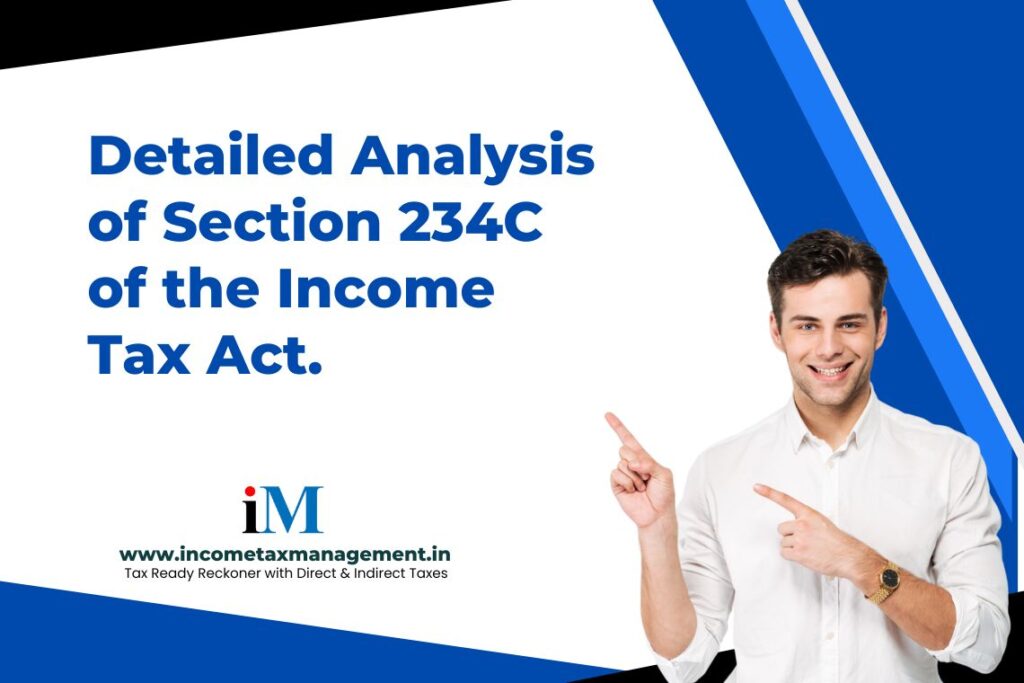Section 234C of the Income Tax Act, 1961, pertains to the levy of interest for deferment of advance tax. This section is crucial for tax professionals to understand as it impacts the computation of interest liabilities for assessee who fail to pay advance tax instalments within the stipulated deadlines. This article provides an in-depth analysis of Section 234C, including its computation mechanics, exceptions, and practical examples to illustrate the calculations.
Overview of Section 234C
Section 234C imposes interest on assessees who defer the payment of advance tax instalments. The advance tax is payable in four instalments during the financial year, and failure to adhere to these deadlines results in an interest charge under this section.
Statutory Provisions
The statutory provisions for advance tax payments are detailed under Section 211 of the Income Tax Act. The due dates and the respective percentages of advance tax payable are as follows:
- On or before 15th June: 15% of the advance tax
- On or before 15th September: 45% of the advance tax (less advance tax already paid)
- On or before 15th December: 75% of the advance tax (less advance tax already paid)
- On or before 15th March: 100% of the advance tax (less advance tax already paid)
Computation of Interest under Section 234C
Interest under Section 234C is calculated at the rate of 1% per month for a period of three months for each instalment of advance tax that is not paid on time. The interest is computed on the amount of the shortfall.
Interest Calculation Formula
The interest under Section 234C is computed as follows:
Interest= (Shortfall in Advance Ta×1%) × 3 months
Where:
- Shortfall in Advance Tax: The difference between the required installment of advance tax and the actual advance tax paid by the due date.
Exception for 80% Payment in First Two Instalments
An important exception to note is that if the assessee has paid at least 80% of the total advance tax liability in the first and two instalments, then interest under Section 234C is not applicable for shortfall in those instalments. This provision helps alleviate the burden of interest if the assessee has made substantial advance tax payments in the initial instalments.
Example of Interest Calculation under Section 234C
Consider an assessee with an estimated total tax liability of Rs. 1,00,000 for the financial year. The advance tax instalments and interest calculation would be as follows:
- Due Date: 15th June
- Required payment: 15% of Rs. 1,00,000 = Rs. 15,000
- Actual payment of this quarter: Rs. 10,000
- Shortfall: Rs. 15,000 – Rs. 10,000 = Rs. 5,000
- Interest: Rs. 5,000 * 1% * 3 months = Rs. 150
- Due Date: 15th September
- Required payment: 45% of Rs. 1,00,000 = Rs. 45,000 (cumulative, less previous payments)
- Actual payment of this quarter: Rs. 30,000
- Shortfall: Rs. 45,000 – Rs. 30,000- Rs. 10,000 = Rs. 5,000
- Interest: Rs. 5,000 * 1% * 3 months = Rs. 150
- Due Date: 15th December
- Required payment: 75% of Rs. 1,00,000 = Rs. 75,000 (cumulative, less previous payments of Rs. 40,000)
- Actual payment of this quarter: Rs. 20,000
- Shortfall: Rs. 75,000 – Rs. 40,000 – Rs. 20,000 = Rs. 15,000
- Interest: Rs. 15,000 * 1% * 3 months = Rs. 450
- Due Date: 15th March
- Required payment: 100% of Rs. 1,00,000 = Rs. 1,00,000 (cumulative, less previous payments of Rs. 60,000)
- Actual payment of this quarter: Rs. 20,000
- Shortfall: Rs. 1,00,000 – Rs. 60,000 – Rs. 20,000 = Rs. 20,000
- Interest: Rs. 20,000 * 1% = Rs. 200 (for one month only)
Total Interest Payable under Section 234C: Rs. 150 + Rs. 150 + Rs. 450 + Rs. 200 = Rs. 950
Exceptions under Section 234C
Interest under Section 234C is not applicable under certain circumstances:
- Resident Senior Citizens: Senior citizens not having any income chargeable under the head “Profits and gains of business or profession” are exempt from paying advance tax (Section 207).
- Advance Tax on Capital Gains: If the shortfall in the payment of advance tax is due to capital gains or income from winnings from lotteries, crossword puzzles, etc., and the assessee pays the required advance tax on such income as part of the remaining instalments or by 31st March of the financial year, no interest under Section 234C is levied (Proviso to Section 234C(1)).
- Income from Business Profession where Presumptive Taxation is opted: For assessees opting for the presumptive taxation scheme under Section 44AD or 44ADA, the entire advance tax is payable by 15th March. Therefore, no interest under Section 234C is applicable for deferment in instalments.
- Income from Business Profession the income accrues or arises under the said head for the first time: provided thatthe assessee has paid the whole of the amount of tax payable in respect of such income, as part of the remaining instalments of advance tax which are due or where no such instalments are due, by the 31st day of March of the financial year.
- Income from Dividends: provided thatthe assessee has paid the whole of the amount of tax payable in respect of such income, as part of the remaining instalments of advance tax which are due or where no such instalments are due, by the 31st day of March of the financial year.
Calculation of amount of Advance tax payable-
Advance tax means the tax chargeable on the total income declared in the return of income furnished by the assessee for the assessment year commencing on the 1st day of April immediately following the financial year in which the advance tax is paid or payable, as reduced by the amount of,—
(i) any tax deductible or collectible at source in accordance with the provisions of Chapter XVII on any income which is subject to such deduction or collection and which is taken into account in computing such total income;
(ia) any relief of tax allowed under section 89;
(ii) any relief of tax allowed under section 90 on account of tax paid in a country outside India;
(iii) any relief of tax allowed under section 90A on account of tax paid in a specified territory outside India referred to in that section;
(iv) any deduction, from the Indian income-tax payable, allowed under section 91, on account of tax paid in a country outside India; and
(v) any tax credit allowed to be set off in accordance with the provisions of section 115JAA or section 115JD.
Important point-
That interest u/s 234C shall apply only on “tax due on the returned income”. Any subsequent addition made to the returned income while assessment shall not attract provisions of interest u/s 234C.
Conclusion
Understanding the intricacies of Section 234C is essential for tax professionals to advise clients accurately and ensure compliance with advance tax payment schedules. Proper planning and timely payments can help avoid the imposition of interest, thereby optimizing the tax liabilities for assessees. Staying abreast with the latest notifications and circulars issued by the CBDT will further enhance the accuracy and efficiency of tax compliance.
By comprehensively analyzing the provisions, exceptions, and computation mechanics of Section 234C, tax professionals can effectively manage and mitigate interest liabilities for their clients.











